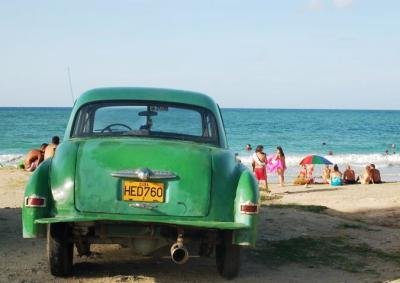Cubans gain car trading status

An official government decree published on Wednesday, September 29, said Cubans and foreign residents would now be able to do with their cars what they wanted "without any prior authorization from any entity."
The regulations, which take effect on Saturday, 1 October, are not without limits, but they were welcomed by Cubans, most of whom have not been able to own cars for more than five decades.
"It's great because it was something forbidden and prices were really high - and if you had a car you weren't able to do anything with it," said office worker Silvia Santos.
"It's a way of freeing something," she said.
The liberalising of car sales was one of more than 300 reforms put forth by Castro and approved in April at a congress of the Communist Party, Cuba's only legal political party.
The proposed changes put a greater emphasis on private initiative, which had been largely stifled under Cuba's Communist system, and less government control.
Previously, only automobiles that were in Cuba before the 1959 revolution could be freely bought and sold, which is why there are so many 1950s or older cars, most of them American-made, rumbling through Cuban streets.
There are also many Soviet-made cars, dating from the era when the Soviet Union was the island's biggest ally and benefactor. They have been available for those with government permission, including assorted officials, athletes, artists and doctors returning from service overseas.
A black market in which people illegally purchased cars licensed to somebody else has also been active.
The new regulations will only allow Cubans with government permission and foreign residents to import cars, while all others will be limited to vehicles already on the island.
They also allow Cubans migrating from the island to sell their cars or to give them to family members, neither of which they could do in the past.
Foreign residents temporarily living on the island will be limited to buying two cars, imported or not, during their stay.
Castro's reforms, which he says are needed to ensure the survival of Cuban communism, are wide-ranging, but have been slow in developing.
"It's a law that should have been approved a long time ago," said taxi driver Fabio Brito, 54. "This exists in all countries in the world. Why should we be different?"
Reaction to the change was swift on Revolico.cu, a website where Cubans buy and sell goods and services.
Listings to buy or sell all kinds of cars were posted on Thursday afternoon, at prices ranging from the equivalent of Rs 720 000 for a 1951 Chevrolet to RS 140 000 for a 1948 Dodge.
The seller of the Dodge, Yosvany, who chose not to give his full name, said he did not know about the new law when he posted his car, he just needed money.
He said the old pre-revolution cars might drop in price as people finally had access to newer models. "Imagine someone who has a Toyota or a Hyundai that they can sell now with the new rules. Prices for those might take off."
One difficulty facing many Cubans, who make an average monthly salary equivalent to about Rs580, will be rounding up the money to buy a car. "It's a good law, but I can't even buy a bicycle," said a peanut vendor who did not give his name.
"Maybe if I can save money one day in my life I will be able to buy a car," said Santos. "It's going to be hard, but at least now it's a possibility."
Nouvelles connexes


